|
|
|
Sort Order |
|
|
|
Items / Page
|
|
|
|
|
|
|
| Srl | Item |
| 1 |
ID:
116436
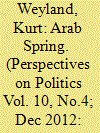

|
|
|
|
|
| Publication |
2012.
|
| Summary/Abstract |
Prominent scholars have highlighted important similarities between the Arab Spring of 2011 and the "revolutions" of 1848: Both waves of contention swept with dramatic speed across whole regions, but ended up yielding rather limited advances toward political liberalism and democracy. I seek to uncover the causal mechanisms that help account for these striking parallels. Drawing on my recent analysis of 1848, I argue that contention spread so quickly because many people in a wide range of countries drew rash inferences from the downfall of Tunisia's dictator. Applying cognitive heuristics that psychologists have documented, they overrated the significance of the Tunisian success, overestimated the similarities with the political situation in their own country, and jumped to the conclusion that they could successfully challenge their own autocrats. This precipitation prompted protests in many settings that actually were much less propitious; therefore problems abounded. Cognitive shortcuts held such sway because Arab societies were weakly organized and repressed and thus lacked leaders from whom common people could take authoritative cues. The decision whether to engage in emulative contention fell to ordinary citizens, who-due to limited information access and scarce experience-were especially susceptible to the simple inferences suggested by cognitive heuristics.
|
|
|
|
|
|
|
|
|
|
|
|
|
|
|
|
| 2 |
ID:
116433
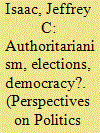

|
|
|
|
|
| Publication |
2012.
|
| Summary/Abstract |
The demand for democracy is a pervasive feature of contemporary political discourse. It is a compelling demand, for citizens and elites who rally beneath the banner of "democracy" and for political scientists who study the ways citizens and elites rally beneath banners in order to mobilize, seek, and contest political power. The force of this demand was captured by the cover of our June 2011 issue, which featured a wall in Egypt's Tahrir Square covered with graffiti stating that "Mubarak must go" and calling for "freedom" and "democracy."
|
|
|
|
|
|
|
|
|
|
|
|
|
|
|
|
| 3 |
ID:
116434
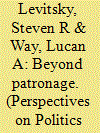

|
|
|
|
|
| Publication |
2012.
|
| Summary/Abstract |
We explore the sources of durability of party-based authoritarian regimes in the face of crisis. Recent scholarship on authoritarianism suggests that ruling parties enhance elite cohesion-and consequently, regime durability-by providing institutionalized access the spoils of power. We argue, by contrast, that while elite access to power and spoils may ensure elite cooperation during normal times, it often fails to do so during crises. Instead, the identities, norms, and organizational structures forged during periods of sustained, violent, and ideologically-driven conflict are a critical source of cohesion-and durability-in party-based authoritarian regimes. Origins in violent conflict raise the cost of defection and provide leaders with additional (non-material) resources that can be critical to maintaining unity and discipline, even when a crisis threatens the party's hold on power. Hence, where ruling parties combine mechanisms of patronage distribution with the strong identities, solidarity ties, and discipline generated by violent origins, regimes should be most durable.
We apply this argument to four party-based competitive authoritarian regimes in post-Cold War Africa: Kenya, Mozambique, Zambia, and Zimbabwe. In each of these cases, an established single- or dominant-party regime faced heightened international pressure, economic crisis, and a strong opposition challenge after 1990. Yet whereas ruling parties in Kenya and Zambia were organized almost exclusively around patronage, those in Mozambique and Zimbabwe were liberation parties that came to power via violent struggle. This difference is critical to explaining diverging post-Cold War regime outcomes: whereas ruling parties in Zambia and Kenya imploded and eventually lost power in these face of crises, those in Mozambique and Zimbabwe remained intact and regimes survived.
|
|
|
|
|
|
|
|
|
|
|
|
|
|
|
|
| 4 |
ID:
116438
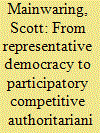

|
|
|
|
|
| Publication |
2012.
|
| Summary/Abstract |
The study of Latin American politics has always generated great new research questions, and within Latin America, no country's experience has generated more interesting questions than Venezuela since the election of Hugo Chávez in 1998. Contemporary Venezuela raises fascinating questions about the collapse of a highly institutionalized party system and the erosion or breakdown of what had been the third-oldest democracy outside of the advanced industrial democracies. What accounts for these stunning developments? What can we learn from them? These issues go to the core of important developments in Latin American politics, and they are major issues for comparative political scientists beyond Latin America.
|
|
|
|
|
|
|
|
|
|
|
|
|
|
|
|
| 5 |
ID:
116435


|
|
|
|
|
| Publication |
2012.
|
| Summary/Abstract |
Reflecting a chiefly economic approach to understanding political outcomes, a burgeoning literature on post-Soviet political economy finds a strong link between privatization and political pluralism in the region. To test whether the political promise of economic liberalization and the logic of modernization that underlies it hold true, I draw on existing and original data on privatization, pluralism, and opposition movements throughout the region from early independence to the present. The data reveal a fundamentally different formulation of the relationship between economics and politics than that found in the standard causal account. Contrary to approaches that stress the "the primacy of economics" in determining political outcomes, numerous cases of post-Soviet capitalist defection to the political opposition clearly point to "the primacy of politics": the tangible ways that formal and informal institutions structure economic opportunities and ultimately impinge on individual calculations to comply with, oppose, or seek refuge from the regime.
|
|
|
|
|
|
|
|
|
|
|
|
|
|
|
|
| 6 |
ID:
116437
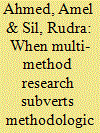

|
|
|
|
|
| Publication |
2012.
|
| Summary/Abstract |
While acknowledging the many forms and contributions of multi-method research (MMR), we examine the costs of treating it as best practice on the grounds that it reduces method-specific weaknesses and increases external validity for findings. Focusing on MMR that combines some type of qualitative analysis with statistical or formal approaches, we demonstrate that error-reduction and cross-validation are not feasible where methods are not sufficiently similar in their basic ontologies and their conceptions of causality. In such cases, MMR may still yield important benefits-such as uncovering related insights or improving the coding of variables-but these can be readily obtained through collaboration among scholars specializing in single-method research (SMR). Such scholars often set the standards for the application of particular methods and produce distinctive insights that can elude researchers concerned about competently deploying different methods and producing coherent findings. Thus, the unchecked proliferation of multi-method skill sets risks forefeiting the benefits of SMR and marginalizing idiographically-oriented qualitative research that fits less well with formal or quantitative approaches. This would effectively subvert the pluralism that once gave impetus to MMR unless disciplinary expectations and professional rewards are predicated on a more balanced and nuanced understanding of what various forms of SMR and MMR bring to the table.
|
|
|
|
|
|
|
|
|
|
|
|
|
|
|
|
| 7 |
ID:
116439


|
|
|
|
|
| Publication |
2012.
|
| Summary/Abstract |
Judging from some of the titles of recent books on Russia-for example, Richard Sakwa's The Crisis of Russian Democracy, Gulnaz Sharafutdinova's Political Consequences of Crony Capitalism inside Russia, and Tom Remington's The Politics of Inequality in Russia-all is not well 20 years after the collapse of the Soviet Union. Corruption abounds, and state institutions are weak where they should be strong or strong where they should be weak. Under Vladimir Putin, democracy has deteriorated since the heady early days of the 1990s, and the negative externalities of Russia's rocky economic transition-especially privatization-have made it so that social inequality permeates postcommunist society.
|
|
|
|
|
|
|
|
|
|
|
|
|
|
|
|
|
|
|
|
|